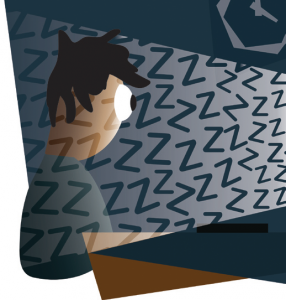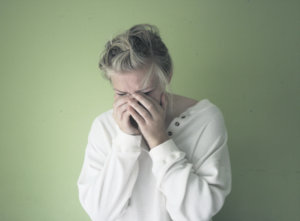WEDNESDAY, 3 OCTOBER 2012
People with depression should sleep less, evidence suggests. Research complied over the last 40 years suggests reduction or complete deprivation of a specific phase of sleep, known as rapid eye movement (REM) sleep may have an effect similar to Prozac, acting as a powerful anti-depressant. For many people in the 21st century sleep deprivation may seem more like a way of life than a condition. Most Cambridge students are certainly more than familiar with, sleepless nights cramming, are just part of the course.The side effects of sleep deprivation are well know to us all; fatigue, weakness, lack of intellectual focus, irritability and a propensity for emotional outbursts. We are told continually that getting enough sleep is an imperative part of life and that, in the long term, lack of sleep can be severely damaging to our health. In fact, the body is capable of surviving longer without food than without sleep. So you could be forgiven for showing surprise upon being told that there is some scientific evidence to suggest that reduced sleep could actually be good for you.
It is well documented that sleeping is not just one constant thing, the way or body and mind acts and reacts changes through a series of well defined phases as we sleep. The different parts of these cycles are recognised by differing degrees of wakefulness. the deeper stages of Non-REM sleep correspond to greatly reduced brain activity and are linked to more restful sleeping with much less body motion, including eye movements. In contrast, during REM sleep, brain activity is at a very similar level to being awake, although your mind remains isolated from the real world. During these phases high brain activity results in vivid dreaming. REM is so called because someone in REM sleep clearly shows a lot of eye movement, appearing to look all around them, whilst they sleep. As with so much of cognitive neuroscience, the definitive role of REM sleep is still unknown, but researchers believe that REM is when our brains are able to catch up with themselves. We use this time to consolidate memories, express subconscious creativity, and in the early stages of life, to drive brain development and repair. It is notable that newborns and infants may spend more than 80% of their sleep in REM phases whilst REM often takes up less than a quarter of an adult sleep pattern.
There is a well established connection between depression and sleep patterns. Noticeably, untreated depression patients typically have longer periods of REM sleep and shorter intervals between them, meaning that in any 24 hour period, depressed patients tend to spend more time in REM sleep. Significantly one of the most commonly noticed side effects of antidepressant drugs is their suppression of REM sleep. In experiments where a patient is denied a night of sleep, some studies have reported up to 60% effectiveness in reducing signs of depression (antidepressants typically have a similar efficacy).
In 1971, a group of researchers led by Dr Burkhard Pflug deprived patients of REM-sleep either by stopping the patient from sleeping at all or by selectively waking the patients when they entered REM phases. The scientists found that depriving people of a single night of REM-sleep demonstrated some improvement in mood and future outlook, apparently illustrating an antidepressant effect that has been supported by several follow-up studies. By contrast, long-term deprivation of an entire night’s sleep is both hazardous for your health and highly unsustainable.
It has been suggested that REM sleep plays a crucial role in the function of neurons (brain cells). Neurons process and transmit information by electrical and chemical signals. Communication between neurons occurs when chemicals released from one neuron cross a small gap known as the synapse and cause a response in a second neuron, this is how your thoughts occur, how you control your body, how you learn new skills and store memories. There are a specific group of chemical signals, called monoamines, which are closely linked to how your brain processes feelings and emotions. When monoamines are transmitted to a new brain cell they initiate new electrical signals which go on to spread messages throughout the brain. The new cell can’t make these signals indefinitely so it slowly ‘desensitises’ and stops responding to the chemical signal.
When chemicals, like monoamines, are used to carry messages between neurons they get used up and it takes time for those chemicals to be regenerated. A key role of REM sleep is to help replace these chemicals whilst the brain is at rest. It has been suggested that this also allows the neurons affected by chemical signals to recover from their effects and return to normal, a process called resensitisation.
The theory, termed the monoamine hypothesis, states that some forms of depression are caused by chemical imbalances in the brain. Many drugs use this hypothesis for the basis of their activities and a lot of therapeutics – as well as several illegal mind-altering substances – closely resemble the chemicals found in the key mood centres of the brain. There are several lines of evidence that have been found to support this viewpoint based around different medical interventions. The drug Reserpine lowers blood pressure by suppressing monoamines, as a side effect it has been known to cause severe depression suggesting monoamines prevent depression. Euphoric effects from amphetamines and cocaine increase the response to monoamines. Finally, the first antidepressant drugs also generally act by increasing monoamine concentrations.
There are multiple theories of how depression develops, including purely cognitive, behavioural, anatomical and biochemical interpretations. However, as responsiveness to treatments varies from case to case, it seems likely that there are many causes that can lead to the development of depression, with chemical disturbances being just one possibility. However, monoamine imbalance is crucial in the consideration of our current treatment of depressed patients, as they are mainly treated in one of two ways: using psychological interventions, such as the extremely effective cognitive behavioural therapy, or pharmacological interventions which tend to target monoamines.
Similarly REM sleep deprivation has been found in certain studies to stimulate the regeneration of small populations of neurons in the hippocampus, a region of the brain involved in memory formation, a finding duplicated in trials of pharmacological antidepressants. Whilst the importance and mechanism by which this hippocampal neurogenesis affects the course of depression is currently unknown, it is further indication that REM sleep deprivation interacts with similar pathways to antidepressant medications. The effects of REM sleep deprivation are also very short lived as there is a strong drive to undergo ‘catch up’ rebound sleep (which can be put off by forcing the patient to only have light sleep afterwards) in a way mirroring the tendency of antidepressants to decline in efficacy over time.
Numerous questions still surround this area of research. The prevailing opinion is that the biochemical changes which occur in depression result in sleep disorders as a side effect. A potential explanation of the research on REM sleep would be that the extended duration of REM sleep in depressed patients results in excessive removal of monoamines from the synapse, meaning that depressed patients have a lower circulating level of monoamines. On a simplistic level, a person’s emotional response is dependent on the monoamines, meaning this imbalance might result in the ‘lack of pleasure’ characteristic of depression, suggesting that the REM sleep imbalances may be compounding the effects of depression.
If this is true then modifications to patients’ sleep cycles, either using new drugs or alarm clocks, when combined with current pharmaceutical therapy to stabilise the effects, might be able to improve the treatment of depression for the low cost of the loss of a bit of shut-eye.
Isaac Elliot is a 3rd Year Undergraduate studying Medicine



